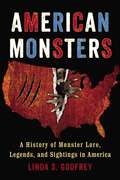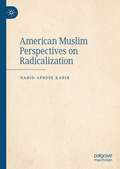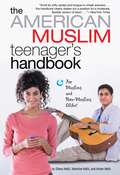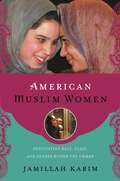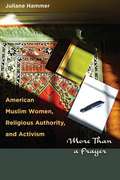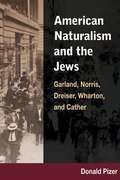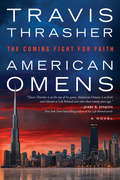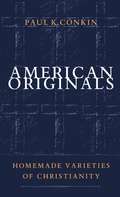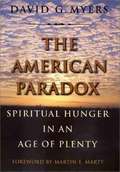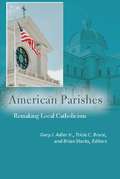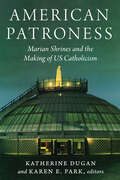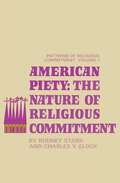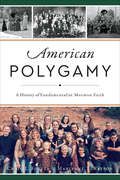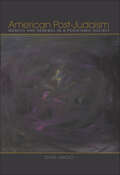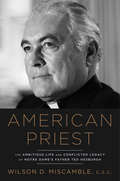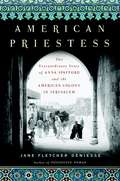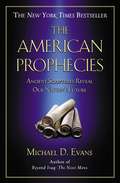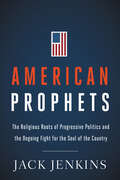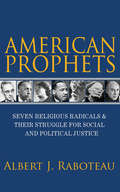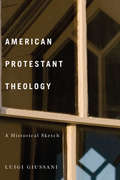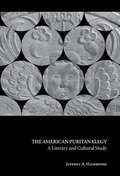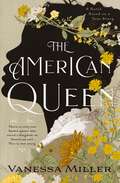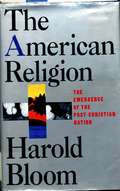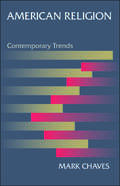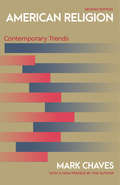- Table View
- List View
American Monsters: A History of Monster Lore, Legends, and Sightings in America
by Linda S. GodfreyFrom pre-Columbian legends to modern-day eyewitness accounts, this comprehensive guide covers the history, sightings and lore surrounding the most mysterious monsters in America--including Bigfoot, the Jersey Devil, and more. Bigfoot, the chupacabra, and thunderbirds aren't just figments of our overactive imaginations--according to thousands of eyewitnesses, they exist, in every corner of the United States. Throughout America's history, shocked onlookers have seen unbelievable creatures of every stripe--from sea serpents to apelike beings, giant bats to monkeymen--in every region. Author, investigator, and creature expert Linda S. Godfrey brings the same fearless reporting she lent to Real Wolfmen to this essential guide, using historical record, present-day news reports, and eyewitness interviews to examine this hidden menagerie of America's homegrown beasts.
American Muslim Perspectives on Radicalization
by Nahid Afrose KabirThis book is a study of American Muslims' perspectives on Muslims who become radicalized and choose to support the Islamic State. Muslim radicalization is a global phenomenon that has affected American Muslims as it has Muslims throughout the world. In 2015, approximately 250 Americans joined the Islamic State (IS), and some still sympathize with it. Based on 51 in-depth interviews conducted in nine states from 2017 to 2021, this book offers a thematic understanding of radicalization, touching on themes such as Islamic history, Muslims' social and political identities, cultural dilemmas, radicalization outlets, mental health, media stereotypes, Islamophobia, security, and the impact of COVID-19 on radicalization. This book differs from previous scholarship on the causes of radicalization by focusing on the perspectives of non-radicalized American Muslims. While some previous scholarship has focused on Muslim radicalization in Europe, this book provides a new spectrum of views from the United States. It also offers pathways to de-radicalization. The interview data is complemented with relevant literature, analysis of media perspectives, and the author's personal observations.
The American Muslim Teenager's Handbook
by Dilara Hafiz Imran Hafiz Yasmine HafizHow do you reconcile being a teenager in America with being a Muslim? It's not as difficult as you think! The American Muslim Teenager's Handbook is a positive, fun, informative guide to being a Muslim teenager in America today. Covering everything from basic Islamic history and reading the Quran to drinking and dating, and filled with thoughts and opinions from Muslim teenagers across the country, this is an indispensable primer, for Muslims and non-Muslims alike, to learning about and finding one's place in American Islamic culture.
American Muslim Women: Negotiating Race, Class, and Gender within the Ummah (Religion, Race, and Ethnicity)
by Jamillah KarimAfrican American Muslims and South Asian Muslim immigrants are two of the largest ethnic Muslim groups in the U.S. Yet there are few sites in which African Americans and South Asian immigrants come together, and South Asians are often held up as a “model minority” against African Americans. However, the American ummah, or American Muslim community, stands as a unique site for interethnic solidarity in a time of increased tensions between native-born Americans and immigrants.This ethnographic study of African American and South Asian immigrant Muslims in Chicago and Atlanta explores how Islamic ideals of racial harmony and equality create hopeful possibilities in an American society that remains challenged by race and class inequalities. The volume focuses on women who, due to gender inequalities, are sometimes more likely to move outside of their ethnic Muslim spaces and interact with other Muslim ethnic groups in search of gender justice.American Muslim Women explores the relationships and sometimes alliances between African Americans and South Asian immigrants, drawing on interviews with a diverse group of women from these two communities. Karim investigates what it means to negotiate religious sisterhood against America's race and class hierarchies, and how those in the American Muslim community both construct and cross ethnic boundaries.American Muslim Women reveals the ways in which multiple forms of identity frame the American Muslim experience, in some moments reinforcing ethnic boundaries, and at other times, resisting them.
American Muslim Women, Religious Authority, and Activism: More Than a Prayer
by Juliane HammerFollowing the events of September 11, 2001, American Muslims found themselves under unprecedented scrutiny. Muslim communities in the United States suffered from negative representations of their religion, but they also experienced increased interest in aspects of their faith and cultures. They seized the opportunity to shape the intellectual contribution of American Muslims to contemporary Muslim thought as never before. Muslim women in particular-often assumed to be silenced, oppressed members of their own communities-challenged stereotypes through their writing, seeking to express what it means to be a Muslim woman in America and carrying out intra-Muslim debates about gender roles and women's participation in society. Hammer looks at the work of significant female American Muslim writers, scholars, and activists, using their writings as a lens for a larger discussion of Muslim intellectual production in America and beyond. Centered on the controversial women-led Friday prayer in March 2005, Hammer uses this event and its aftermath to address themes of faith, community, and public opinion. Tracing the writings of American Muslim women since 1990, the author covers an extensive list of authors, including Amina Wadud, Leila Ahmed, Asma Barlas, Riffat Hassan, Mohja Kahf, Azizah al-Hibri, Asra Normani, and Asma Gull Hasan. Hammer deftly examines each author's writings, demonstrating that the debates that concern American Muslim women are at the heart of modern Muslim debates worldwide. While gender is the catalyst for Hammer's study, her examination of these women's intellectual output touches on themes central to contemporary Islam: authority, tradition, Islamic law, justice, and authenticity.
American Naturalism and the Jews: Garland, Norris, Dreiser, Wharton, and Cather
by Donald PizerAmerican Naturalism and the Jews examines the unabashed anti-Semitism of five notable American naturalist novelists otherwise known for their progressive social values. Hamlin Garland, Frank Norris, and Theodore Dreiser all pushed for social improvements for the poor and oppressed, while Edith Wharton and Willa Cather both advanced the public status of women. But they all also expressed strong prejudices against the Jewish race and faith throughout their fiction, essays, letters, and other writings, producing a contradiction in American literary history that has stymied scholars and, until now, gone largely unexamined. In this breakthrough study, Donald Pizer confronts this disconcerting strain of anti-Semitism pervading American letters and culture, illustrating how easily prejudice can coexist with even the most progressive ideals. Pizer shows how these writers' racist impulses represented more than just personal biases, but resonated with larger social and ideological movements within American culture. Anti-Semitic sentiment motivated such various movements as the western farmers' populist revolt and the East Coast patricians' revulsion against immigration, both of which Pizer discusses here. This antagonism toward Jews and other non-Anglo-Saxon ethnicities intersected not only with these authors' social reform agendas but also with their literary method of representing the overpowering forces of heredity, social or natural environment, and savage instinct.
American Omens: The Coming Fight for Faith: A Novel
by Travis ThrasherIn this taut thriller that depicts a future where belief is dangerous, faith is deemed hatred, and a group of powerful elite keeps watch, the Reckoner has come to wake up America.The year is 2038 and Cheyenne Burne is a brilliant young programmer working for Acatour, the world's top technology firm. Her father converts to Christianity, and he suddenly disappears without a trace. When a stranger hands Cheyenne a coded message that sends her on a collision course with a clandestine group of believers, she must put her life in the hands of those following a man known only as the Reckoner. He claims he wants to bring back true faith in Christ to America and also reveal the forces behind the disappearances of the many renowned people who publicly declared their Christian faith. Operating in the shadows and living off the grid, this mysterious prophet assembles a ragtag team--including a former bookseller whose store was shut down for selling prohibited books--to help him take the battle for transparency to the top. With a ruthless FBI agent closing in, can Cheyenne and the others expose the truth and lead a return to God in America before it's too late?
American Originals
by Paul K. ConkinIn a work of striking breadth and clarity, Paul Conkin offers an even-handed and in-depth look at the major American-made forms of Christianity--a diverse group of religious traditions, each of which reflects a significant break from western Christian orthodoxy. Identifying six distinctive types, Conkin examines the major denominations representative of each original variety of American Christianity: restoration (Churches of Christ, Disciples of Christ); humanistic (Unitarians, Universalists); apocalyptic (Adventists, Jehovah's Witnesses); Mormon (Church of Jesus Christ of Latter-day Saints); spiritual (Christian Science, Unity); and ecstatic (Holiness and Pentecostal denominations). Focusing on the early years and maturation of these groups, he discusses their founders and leaders, origins and Old World roots, and essential doctrines and practices. Conkin closes each chapter with a guide to further reading. The first comprehensive survey of these American originals, this book will serve as a valuable resource on a number of religious traditions whose members not only comprise a significant percentage of the American population but also make up an increasing proportion of Christian converts worldwide.
The American Paradox: Spiritual Hunger in an Age of Plenty
by David G. MyersWell-known social psychologist David G. Myers addresses why Americans can have so many social problems--reflecting a deep spiritual poverty--at a time when material wealth is at record levels. 32 illustrations.
American Parishes: Remaking Local Catholicism (Catholic Practice in North America)
by Gary J. Adler Jr., Tricia C. Bruce, and Brian StarksParishes are the missing middle in studies of American Catholicism. Between individual Catholics and a global institution, the thousands of local parishes are where Catholicism gets remade. American Parishes showcases what social forces shape parishes, what parishes do, how they do it, and what this says about the future of Catholicism in the United States. Expounding an embedded field approach, this book displays the numerous forces currently reshaping American parishes. It draws from sociology of religion, culture, organizations, and race to illuminate basic parish processes, like leadership and education, and ongoing parish struggles like conflict and multiculturalism. American Parishes brings together contemporary data, methods, and questions to establish a sociological re-engagement with Catholic parishes and a Catholic re-engagement with sociological analysis. Contributions by leading social scientists highlight how community, geography, and authority intersect within parishes. It illuminates and analyzes how growing racial diversity, an aging religious population, and neighborhood change affect the inner workings of parishes. Contributors: Gary J. Adler Jr., Nancy Ammerman, Mary Jo Bane, Tricia C. Bruce, John A. Coleman, S.J., Kathleen Garces-Foley, Mary Gray, Brett Hoover, Courtney Ann Irby, Tia Noelle Pratt, and Brian Starks
American Patroness: Marian Shrines and the Making of US Catholicism (Catholic Practice in the Americas)
by Katherine Dugan and Karen E. ParkA vital collection of interdisciplinary essays that illuminates the significance of Marian shrines and promises to teach scholars how to “read” them for decades to come.American Patroness: Marian Shrines and the Making of US Catholicism is a collection of twelve essays that examine the historical and contemporary roles of Marian shrines in US Catholicism. The essays in this collection use historical, ethnographic, and comparative methods to explore how Catholics have used Marian devotion to make an imprint on the physical and religious landscape of the United States. Using the dynamic malleability of Marian shrines as a starting place for studying US Catholicism, each chapter reconsiders the American religious landscape from the perspective of a single shrine to Mary and asks: What does this shrine reveal about US Catholicism and about American religion?Each of the contributors in American Patroness examines why and how Marian shrines persist in the twenty-first century and subsequently uses that examination to re-read contemporary US Catholicism. Because shrines are not neutral spaces—they reflect and shape the elastic yet strict boundaries of what counts as Catholic identity, and who controls prayer practices—the studies in this collection also shed light on the contested dynamics of these holy sites. American Patroness demonstrates that Marian shrines continue to be places where an American Catholic identity is continuously worked on, negotiations about power occur, and Marian relationships are fostered and nurtured in spaces that are simultaneously public and intimate.
American Piety: The Nature of Religious Commitment
by Rodney Stark Charles Y. GlockHow religious are Americans these days? How many still believe in God, in Biblical miracles, in heaven and hell? Do people pray? How much money is being given to churches, by Episcopalians, Presbyterians, Roman Catholics, Lutherans, and other groups? American Piety, the first of a three-volume study of religious commitment, answers these and a host of other questions about the contemporary religious scene. Particularly startling are the contrasts in beliefs, practices, and experiences revealed among the eleven major Christian denominations whose membership is compared.
American Polygamy: A History of Fundamentalist Mormon Faith
by Craig L. Foster Marianne T. WatsonToday's Fundamentalist Mormons in the American West resist assimilation like their forefathers. Centered on faith, they survive despite efforts to permanently end their cherished plural family arrangements. While some Fundamentalists like Warren Jeffs go rogue and corrupt their beliefs in heinous crimes, most hold steadfastly to a religion they say is biblical and restored by the first Latter-day Saint prophet, Joseph Smith, in the early 1800s. Mormon historians Craig Foster and Marianne Watson present more than two hundred photos and exclusive insights to explain how an estimated thirty thousand Fundamentalist Mormons still venerate a much-debated legacy—despite its difficult challenges—and persist in living plural marriage.
American Post-Judaism: Identity and Renewal in a Postethnic Society (Religion in North America)
by Shaul MagidHow do American Jews identify as both Jewish and American? American Post-Judaism argues that Zionism and the Holocaust, two anchors of contemporary American Jewish identity, will no longer be centers of identity formation for future generations of American Jews. Shaul Magid articulates a new, post-ethnic American Jewishness. He discusses pragmatism and spirituality, monotheism and post-monotheism, Jesus, Jewish law, sainthood and self-realization, and the meaning of the Holocaust for those who have never known survivors. Magid presents Jewish Renewal as a movement that takes this radical cultural transition seriously in its strivings for a new era in Jewish thought and practice.
American Priest: The Ambitious Life and Conflicted Legacy of Notre Dame's Father Ted Hesburgh
by Wilson D. MiscambleA provocative new biography probes deeply into the storied life of Father Ted Hesburgh, the well-loved but often controversial president of Notre Dame University. Considered for many decades to be the most influential priest in America, Rev. Theodore M. Hesburgh, played what many consider pivotal roles in higher education, the Catholic Church, and national and international affairs. American Priest examines his life and his many and varied engagements—from the university he led for thirty-five years to his associations with the Vatican and the White House—and evaluates the extent and importance of his legacy. Author and Notre Dame priest-professor Wilson D. Miscamble tracks how Hesburgh transformed Catholic higher education in the postwar era and explores how he became a much-celebrated voice in America at large. Yet, beyond the hagiography that often surrounds Hesburgh’s legacy lies another more complex and challenging story. What exactly were his contributions to higher learning; what was his involvement in the civil rights movement; and what was the nature of his role as advisor to popes and presidents? Understanding Hesburgh’s life and work illuminates the journey that the Catholic Church traversed over the second half of the twentieth century. Exploring and evaluating Hesburgh’s importance, then, contributes not only to the colorful history of Notre Dame but also to comprehending the American Catholic experience.
American Priestess: The Extraordinary Story of Anna Spafford and the American Colony in Jerusalem
by Jane Fletcher GeniesseFor generations in Jerusalem, a fabled mansion has been the retreat for foreign correspondents, diplomats, pilgrims and spies but until now, few have known the true story of the house that became the American Colony Hotel or its bizarre history of tragedy, religious extremism, emotional blackmail, and peculiar sexual practices. During the boom years following the Civil War, in the country's heartland capital, Chicago, a prominent lawyer Horatio Spafford and his blue-eyed wife Anna rode the mighty wave of Protestant evangelicalism deluging the nation. When suddenly tragedy struck, the charismatic Spaffords, grieving, attracted followers eager to believe their prophecy that the Second Coming was at hand and in 1881 sailed with them to Jerusalem to see the Messiah alight on the Mount of Olives. No sooner had they settled into the Holy City than the U.S. Consul and the established Christian missionaries declared them heretics and whispered of sexual deviance. Yet Muslims and Jews admired their unflagging care of the sick and the needy, and Jews were intrigued with their advocacy of a Jewish Return to Zion. When Horatio died, Anna assumed leadership, shocking even her adherents by abolishing marriage and established a dictatorship that was not always benevolent. Ever dogged by controversy, she and her credulous followers lived through and closely participated in the titanic upheavals that eventually formed the modern Middle East. Written with flair and insight, American Priestess provides a fascinating exploration of the seductive power of evangelicalism and raises questions about the manipulation of religion to serve personal goals. A powerful narrative, the story sweeps through the dramatic collapse of the Ottoman Empire, the establishment of the British Mandate, and finally the founding of Israel where Anna's house in East Jerusalem, now the American Colony Hotel, stands as an exemplar of beauty and comfort, despite its turbulent history.
American Prophecies: Ancient Scriptures Reveal Our Nation's Future
by Michael D. EvansHow is America tied into ancient biblical prophecies? According to author Michael Evans, a fundamentalist Christian minister, biblical prophets already predicted that America is doomed to collapse unless its government stops accommodating the Arab world for the sake of oil and instead offers full military and diplomatic support to Israel. He believes that God wants Israel to have full control of the West Bank and Gaza, and Americans are risking God's wrath by not fully supporting this biblical mandate. Evans also theorizes that much of America's problems--including the attack of 9-11--are indications of God's fury over America's split allegiance between the two famous descendents of Abraham: Ishmael and Isaac. "We are caught in a tug of war between two brothers--between oil, political expedience, and conscience in many ways--and it our decisions and polices concerning these two brothers that will determine whether the United States will survive or go the way of the Roman Empire," he writes. Evans's prophetic foundation begins with the parable of the fig tree (Matthew 24:32-44), in which he interprets the various signs Jesus gave his disciples to mark "the final age and his return." Obviously, the Bible can be interpreted many ways, and Evans uses 17 chapters to weave in interpretations of scripture that support his theory that America faces a mammoth choice--ruin or salvation. Although actual quotes from scripture are rather sparse throughout the book, he concludes with a five-page index of "Ancient Prophecies" that indirectly support his theory. One caveat--Evans (Beyond Iraq) does not hide his vehement anti-Muslim leanings. This book will probably be offensive to Christians who practice religious tolerance and lean toward a more-inclusive solution to American diplomacy in the Middle East. --Gail Hudson
American Prophets: The Religious Roots of Progressive Politics and the Ongoing Fight for the Soul of the Country
by Jack Jenkins“[A] thoroughly reported [and] revelatory history about the intersection of progressive politics and religion in America” (Publishers Weekly).Since the 1970s, the Religious Right has established itself as a coalition of fundamentalist powerbrokers who set the standard for Christian political values. But, as religion reporter Jack Jenkins contends, the country is also driven by a vibrant, long-standing moral force from the left. Taking many forms and many names, the Religious Left has operated since America’s founding—praying, and protesting for progressive values such as abolition, labor reform, civil rights, environmental preservation.In American Prophets, Jenkins examines the re-emergence of progressive faith-based activism, detailing its origins and contrasting its goals with those of the Religious Right. Today’s rapidly expanding interfaith coalition — which includes Christians, Jews, Muslims, Buddhists, and other faiths — has become a force within the larger “resistance” movement. Jenkins profiles Washington political insiders—including former White House staffers and faith outreach directors for the campaigns of Barack Obama, John Kerry, and Hillary Clinton—as well as a new generation of progressive faith leaders, including:Linda Sarsour, co-chair of the Women’s MarchRev. Traci Blackmon, a pastor near Ferguson, Missouri, who lifts up black liberation efforts across the countrySister Simone Campbell, head of the Catholic social justice lobby and the “Nuns on the Bus” tour organizerNative American “water protectors” who demonstrated against the Dakota Access Pipeline in Standing RockBishop Gene Robinson, the first openly gay Episcopal bishop
American Prophets: Seven Religious Radicals and Their Struggle for Social and Political Justice
by Albert J. RaboteauAmerican Prophets sheds critical new light on the lives and thought of seven major prophetic figures in twentieth-century America whose social activism was motivated by a deeply felt compassion for those suffering injustice.In this compelling and provocative book, acclaimed religious scholar Albert Raboteau tells the remarkable stories of Abraham Joshua Heschel, A. J. Muste, Dorothy Day, Howard Thurman, Thomas Merton, Martin Luther King, Jr., and Fannie Lou Hamer--inspired individuals who succeeded in conveying their vision to the broader public through writing, speaking, demonstrating, and organizing. Raboteau traces how their paths crossed and their lives intertwined, creating a network of committed activists who significantly changed the attitudes of several generations of Americans about contentious political issues such as war, racism, and poverty. Raboteau examines the influences that shaped their ideas and the surprising connections that linked them together. He discusses their theological and ethical positions, and describes the rhetorical and strategic methods these exemplars of modern prophecy used to persuade their fellow citizens to share their commitment to social change.A momentous scholarly achievement as well as a moving testimony to the human spirit, American Prophets represents a major contribution to the history of religion in American politics. This book is essential reading for anyone who is concerned about social justice, or who wants to know what prophetic thought and action can mean in today's world.
American Protestant Theology
by Luigi Giussani Damian BacichIn American Protestant Theology, Luigi Giussani traces the history of the most meaningful theological expressions and the cultural significance of American Protestantism, from its origins in seventeenth-century Puritanism to the 1950s. Giussani clarifies and assesses elements of Protestantism such as the democratic approach to Church-State relations, "The Great Awakening," Calvinism and Trinitarianism, and liberalism. His rich references and analytical descriptions reconstruct an overview of the development of a religion that has great importance in the context of spiritual life and American culture. He also displays full respect for the religious depth from which Protestantism was born and where it can reach, and expresses great admiration for its most prominent thinkers and spiritual leaders, including Jonathan Edwards, Horace Bushnell, Walter Rauschenbusch, Reinhold Niebuhr, and Paul Tillich. Further testament to Giussani's clear-minded and comprehensive knowledge of Christianity, American Protestant Theology makes the work of a master theologian available in English for the first time.
The American Puritan Elegy: A Literary and Cultural Study
by Jeffrey A. HammondHammond reconstructs the historical, theological and cultural contexts of these poems to demonstrate how they responded to a specific process of mourning defined by Puritan views on death and grief.
The American Queen
by Vanessa MillerThere is only one known queen who truly ruled a kingdom on American soil.Transformative and breathtakingly honest, The American Queen is based on actual events that occurred between 1865 - 1889 and shares the unsung history of a Black woman who built a kingdom as a refuge for the courageous people who dared to dream of a different way of life. As seen on Good Morning America: GMA 15 New Books to Read!Over the twenty-four years she was enslaved on the Montgomery Plantation, Louella learned to feel one thing: hate. Hate for the man who sold her mother. Hate for the overseer who left her daddy to hang from a noose. Hate so powerful there's no room in her heart for love, not even for the honorable Reverend William, whom she likes and respects enough to marry.But when William finally listens to Louella's pleas and leads the formerly enslaved people off the plantation, Louella begins to replace her hate with hope. Hope that they will find a place where they can live free from fear. Hope that despite her many unanswered prayers, she can learn to trust for new miracles.Soon, William and Louella become the appointed king and queen of their self-proclaimed Kingdom of the Happy Land. And though they are still surrounded by opposition, they continue to share a message of joy and goodness--and fight for the freedom and dignity of all.The American Queen weaves together themes of love, hate, hope, trust, and resilience in the face of great turmoil. With every turn of the page, you will be transported to a pivotal period in American history, where oppressed people become extraordinary heroes.
American Religion: The Emergence of the Postchristian Nation
by Harold BloomHow America has developed unique religious groups.
American Religion
by Mark ChavesMost Americans say they believe in God, and more than a third say they attend religious services every week. Yet studies show that people do not really go to church as often as they claim, and it is not always clear what they mean when they tell pollsters they believe in God or pray. American Religion presents the best and most up-to-date information about religious trends in the United States, in a succinct and accessible manner. This sourcebook provides essential information about key developments in American religion since 1972, and is the first major resource of its kind to appear in more than two decades. Mark Chaves looks at trends in diversity, belief, involvement, congregational life, leadership, liberal Protestant decline, and polarization. He draws on two important surveys: the General Social Survey, an ongoing survey of Americans' changing attitudes and behaviors, begun in 1972; and the National Congregations Study, a survey of American religious congregations across the religious spectrum. Chaves finds that American religious life has seen much continuity in recent decades, but also much change. He challenges the popular notion that religion is witnessing a resurgence in the United States--in fact, traditional belief and practice is either stable or declining. Chaves examines why the decline in liberal Protestant denominations has been accompanied by the spread of liberal Protestant attitudes about religious and social tolerance, how confidence in religious institutions has declined more than confidence in secular institutions, and a host of other crucial trends.
American Religion: Contemporary Trends
by Mark ChavesMost Americans say they believe in God, and more than a third say they attend religious services every week. Yet studies show that people do not really go to church as often as they claim, and it is not always clear what they mean when they tell pollsters they believe in God or pray. American Religion presents the best and most up-to-date information about religious trends in the United States, in a succinct and accessible manner. This sourcebook provides essential information about key developments in American religion since 1972, and is the first major resource of its kind to appear in more than two decades. Mark Chaves looks at trends in diversity, belief, involvement, congregational life, leadership, liberal Protestant decline, and polarization. He draws on two important surveys: the General Social Survey, an ongoing survey of Americans' changing attitudes and behaviors, begun in 1972; and the National Congregations Study, a survey of American religious congregations across the religious spectrum. Chaves finds that American religious life has seen much continuity in recent decades, but also much change. He challenges the popular notion that religion is witnessing a resurgence in the United States--in fact, traditional belief and practice is either stable or declining. Chaves examines why the decline in liberal Protestant denominations has been accompanied by the spread of liberal Protestant attitudes about religious and social tolerance, how confidence in religious institutions has declined more than confidence in secular institutions, and a host of other crucial trends. Now with updated data and a new preface by the author, this revised edition provides essential information about key developments in American religion since 1972, plainly showing that religiosity is declining in America.
